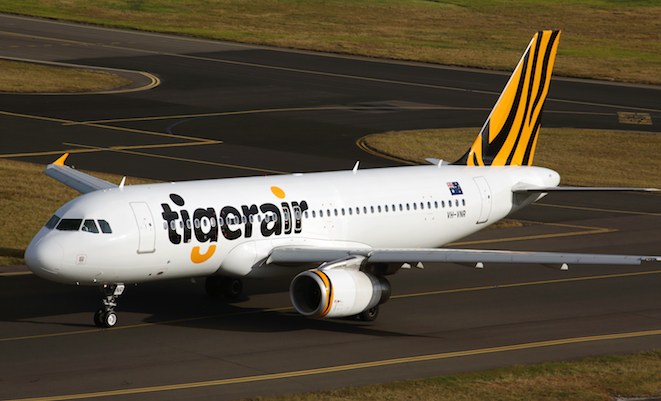
Virgin Australia says the takeover of Tigerair Australia will fast track the low-cost carrier’s path to profitability through international expansion and back room cost efficiencies.
Australia’s second-largest carrier will pay A$1 to pick up the remaining 40 per cent of Tigerair that it does not already own from Singapore-based Tiger Airways Holdings.
Tigerair will retain its name through a brand and licensing agreement with Tiger Holdings, and maintain a separate head office in Melbourne.
Once the transaction meets all conditions precedent, including Foreign Investment Review Board approval, Virgin will have full control of Tigerair. That should enable the two carriers to share back office resources, as well as maintenance and engineering support and other airport handling services in a bid to reduce costs.
Moreover, Virgin and Tigerair will have the flexibility to more closely coordinate their respective networks, with the proposed transaction giving the budget carrier the opportunity for new growth opportunities such as international short-haul routes.
“Given the ongoing subdued consumer demand in the Australian domestic market, the growth of the Tigerair Australia domestic fleet is likely to be reduced,” Virgin chief executive John Borghetti said in a statement.
“Under this proposed transaction, we will benefit from the economies of scale and achieve profitability ahead of schedule by the end of 2016, by leveraging the resources of the wider Virgin Australia Group.”
The Bloomberg news agency reported Virgin chief financial officer Sankar Narayan saying: “This is the quickest way that we can get Tiger on a break-even proposition.”
However, CIMB analysts Mark Williams and Alexander Lu said they remained of the view it would be 2017/18 at least before Tigerair got out of the red.
“Given they have already been working together we are not rushing to change our view on Tiger being loss-making until FY18,” the pair wrote in a research note dated October 17.
The analysts said the use of Tigerair aircraft on international destinations, as well as slowing the delivery of new aircraft, would be positive for whole the Australian domestic market.
“VAH management is already flagging slower growth out of Tiger, which we think means they will try to slow the deliveries of Tiger to closer to one per year,” they said.
“With VAH slowing growth in both its Virgin and Tiger brands, the profitability of the overall industry should improve vastly from where it was in FY14.”
While Virgin was expected to maintain services to leisure spots such as Bali and Phuket, there was an opportunity for Tigerair to perhaps take over some Virgin’s services to a number of popular tourist destinations in its route network. Also, it was understood Virgin’s alliance with Air New Zealand would not prevent Tigerair from operating across the Tasman.
Virgin paid $35 million to purchase its initial 60 per cent stake in Tigerair, after the deal was given the green light from regulators in April 2013.
Tigerair started flying in Australia in 2007 and has never made a profit in this country as the airline struggled to achieve scale. Its public reputation suffered badly in 2011 when the aviation regulator grounded the airline for six weeks over safety concerns.
The airline currently operates a fleet of 13 Airbus A320 aircraft to 17 Australian destinations.
Virgin said its share of equity accounted loses at Tigerair was $11.6 million in the first quarter of 2014/15, up from $9.7 million in the prior corresponding period “as a result of ongoing subdued consumer sentiment”.
Tiger Holdings’ divestment of its Australian arm is the latest move from the Singapore-based airline group to deal with heavy losses as a consequence of huge overcapacity in the region, having shut down Indonesia-based Tigerair Mandala and sold its Philippine operations to Cebu Pacific Air in 2014.
The company owned Tigerair Singapore and held a 10 per cent stake Tigerair Taiwan, which commenced operations on September 26.
It recently signed an agreement to sublease 12 aircraft to Indian carrier Indigo in a bid to find homes for surplus aircraft in its fleet.
Tiger Holdings said in a separate statement the estimated net loss from the sale would be S$60.1 million.
“Following a careful reassessment of the company’s investment in Tiger Australia, the board is of the view that a divestment of the group’s stake in Tiger Australia would be in the best interests of the company’s shareholders,” Tiger Holdings said.
“With the divestment of Tiger Australia, the group will channel its resources towards the execution of its turnaround plan, which includes a focus on continuing its cost management plans, enhancing aircraft utilisation efficiency, and aligning its network to customer demand.”
Tourism and Transport Forum chief executive Margy Osmond said the deal would strengthen Tigerair’s position in the Australian market.
“This proposal will ensure that Tigerair will have a secure future in Australia,” Osmond said in a statement.
“Australia’s tourism industry is highly reliant on aviation for visitor access to destinations around the country and today’s announcement is a vote of confidence in the sector’s future.”
Virgin shares were steady at 37.5 cents in late afternoon trading on Friday.




